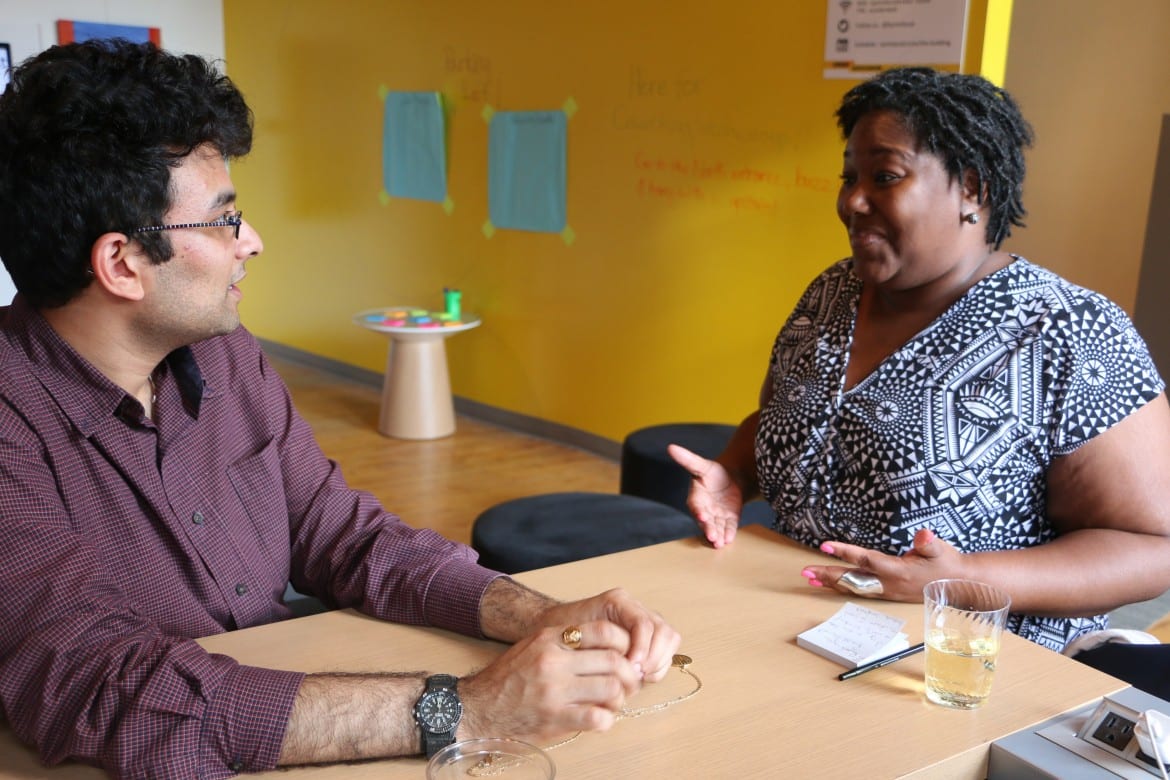Finding solutions for the student-transfer problem Discussions around high- and low-tech innovations for creating a smoother process continue after education summit
 Aditya Voleti, left, and Catina Taylor discuss the root causes of student mobility issues at a gathering in the Crossroads. The event was a follow-up to a student mobility summit held earlier this month in Kansas City. (Photo: Mike Sherry | Flatland)
Aditya Voleti, left, and Catina Taylor discuss the root causes of student mobility issues at a gathering in the Crossroads. The event was a follow-up to a student mobility summit held earlier this month in Kansas City. (Photo: Mike Sherry | Flatland)
Published September 18th, 2015 at 12:40 PM
Kansas City building toward solutions for student-transfer problem
When dozens of educators and social service professionals gathered recently in Kansas City to discuss the problem of transient students, the proposed solutions essentially boiled down to old-fashioned personal interventions and technology-driven assistance.
The occasion for the gathering was a Student Mobility Summit convened by Kansas City Mayor Sly James, and on Thursday evening backers of the initiative gathered to continue the conversation at The Lean Lab, a Crossroads-based organization dedicated to fostering innovation in education.
On the table were ideas from the summit, which ranged from posting parent-to-parent ambassadors at schools to welcome in new families to establishing an electronic Student Locker & MAPS (Missouri Academic Portal Solution), where birth certificates and other key documents would be readily available to school officials for a transfer student.
But one of the main outputs of Thursday’s 90-minute event were Post-It Notes stuck to a “can provide” or a “wants/needs” poster, where the former included “data-hungry students at KU in IT program” and the latter included “how social service agencies can help schools better.”
The session also included a presentation by AT&T representative Molly Kocour-Boyle on the company’s Data for Diplomas challenge, a nationwide competition aimed at identifying innovative ways to increase high school graduation by using datasets. The competition includes $40,000 in prize money.
There is talk locally that ideas from the mobility summit could be turned into an application for the project.
AT&T is running the competition to support the GradNation campaign, which aims to increase the nation’s high school graduation rate to 90 percent by 2020. According to the campaign, it stands at about 80 percent now.
AT&T is a prime sponsor of GradNation community summits around the country, and the local mobility summit was one of those community gatherings.
Turn the Page Kansas City, a nonprofit dedicated to ensuring all children in the city read at or above reading proficiency by the third grade, is facilitating the follow-up from the summit. The hope is to have at least one pilot project in operation by the start of the next school year.
The Sept. 1 summit drew about 150 attendees, and it included the release of data from a mobility report conducted by the Kansas City Area Education Research Consortium. Kansas City Public Television reported on some of the consortium’s early findings early last year.
Among the findings released at the mobility summit were that in the 2014-15 school year alone, including the summer, there were more than 44,000 student transfers among students in the Kansas City area.
The research also found that, on average, students missed four school days between each transfer, with about 10 percent of the transferees missing a dozen days or more with each move.
Meanwhile, the findings also showed that student achievement suffered among mobile students – with those on the move only 60 percent as likely as their peers to be proficient in communication arts.
One of the participants at Thursday evening’s event was Kent Yocum, a teaching and learning coach at Winnwood Elementary School in the North Kansas City School District.
He has seen how technology solutions can be expensive and difficult to implement.
On the other hand, Yocum said, he has seen the benefit of waving to families as he helps direct traffic at the school.
“The old-fashioned solutions – that is what works,” he said.


